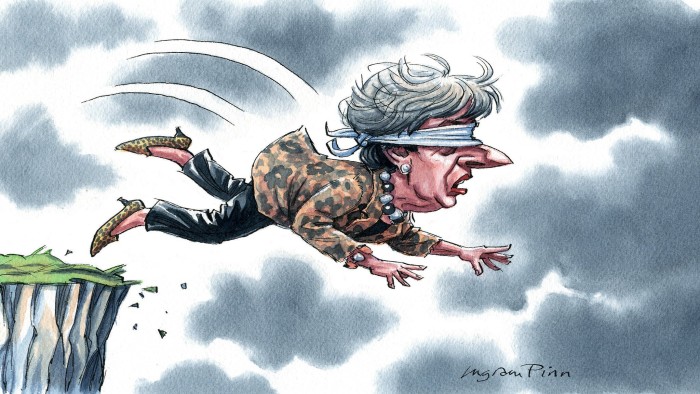Opinion today: Brexit — jump first, argue later

This article is from today’s FT Opinion email. Sign up to receive a daily digest of the big issues straight to your inbox.
“Tell us what you want!” That is the plaintive cry of Britain’s European partners as they search, so far in vain, for a clear sense of where Theresa May and her colleagues intend to take their country as it prepares to leave the EU.
The problem, argues Philip Stephens in his latest column, is that Mrs May has no “organising vision of the shape of Britain’s post-Brexit relationship with its own continent”. The prime minister has concentrated on crafting a narrative of departure that will satisfy restive Brexiters in the cabinet and on the Conservative backbenches. It is enough, she seems to believe, that Britain will leave the bloc in March next year. The details — the scope of a trade deal, the role of the European Court of Justice, the meaning of “regulatory alignment” and so on — can be left for another day.
Downing Street insiders, Philip writes, “find it is easier to divine the thinking deep inside Vladimir Putin’s Kremlin than get straight answers from Number 10”. Considerations of internal party management have trumped any attempt at sketching, even in the roughest outline, Britain’s future relationship with the EU. The result, Philip concludes, is that we are in the dark. And the prime minister “intends that this is how it should remain.”

Dollar dilemma: In normal circumstances, the assumption is that a country with a surging economy and rising interest rates will see its currency strengthen. But in Donald Trump’s America, writes Gillian Tett, these aren’t normal circumstances. The protectionist rhetoric emanating from the White House has fuelled suspicions that Washington will use a weaker dollar to support its dash for growth.
Balance sheet bungles: The collapse of the outsourcing giant Carillion has focused attention on the private finance initiative and public-private partnerships more generally. There are good and bad arguments for PFI, Martin Wolf argues. The worst of these is that it is off the government’s balance sheet. This is a fiscal illusion. In fact, a contract with a private service provider creates long-term liabilities, just as government borrowing does.
Time’s up: Last week’s Presidents Club fundraiser was a loathsome event. What made it particularly shocking, according to an FT editorial, was the context: “This display of male entitlement was linked to institutions and individuals at the centre of the British establishment.” Executives who participated missed a fundamental change in social mores. And this is evidence of “catastrophically bad judgment.”
Best of the rest
No, we’re not going to bury May ‘68 — Alain Krivine and Alain Cyroulnik in Le Monde (in French)
Seeing through the fog in the Mueller Russia probe — Ryan Goodman in The New York Times
‘A mistake not a disaster’: Cameron fondues while Britain burns — Polly Toynbee in The Guardian
The rising pressure of the #MeToo backlash — Jia Tolentino in the New Yorker
The EU embodies conservative principles. Can’t the Tory party see that? — Oliver Kamm in Prospect
What you’ve been saying
You have work to do at home first, Mr Modi — letter from Rajendra Aneja:
Indian prime minister Narendra Modi’s scintillating opening address at Davos showcased India as a future investment destination. He has promised that red tape will be replaced by a red carpet. This is great. However, a red carpet cannot be spread over the dilapidated roads of most Indian cities. Nor will healthy living be possible in smog-impacted cities like Delhi. The government should ensure that the performance matches the promise.
Comment from European Observer on America’s political journey into tribalism:
It is truly remarkable how fast the common ground in the centre of US politics has disappeared. Today there is almost no overlap in opinions on virtually any subject between Democrats and Republicans — consensus has gone. People increasingly live in areas where every one else shares their views, and there is no overlap in where they get their news from. The Supreme Court has become an extension of the polarisation — not so much judges as politicians in robes.
Wrong moment to limit the City’s ambition — letter from Miles Celic:
The UK cannot be in a position where it is a rule taker, unable to shape the rules that dictate how its leading industries operate. This would be a slow death for London and the UK as a global financial centre. But the current “equivalence” regime is far from the solution. It doesn’t allow for divergence and it would leave the UK a rule taker, with the added uncertainty of expulsion from EU markets on a political whim. Also, equivalence arrangements don’t currently exist for large parts of the financial services industry. Establishing these would involve multiple legislative changes. This is a huge task, and probably a decade-long project.
Today’s opinion
If you want to run the world, study a ‘useless’ subject As robots take over routine jobs, we need people who can think creatively
Instant Insight: Britain desperately needs a functioning apprenticeship system But the government’s poorly designed levy will not deliver it
Why a sliding dollar may come back to bite Donald Trump Speculation grows over whether the US plans to use a weaker currency to support growth
Free Lunch: Who’s afraid of free movement? EU should learn from US barriers to mobility
Britain’s PFI is a good idea done for bad reasons The practice creates a long-term liability, just as government borrowing does
Opinion today: Politicians are not all bad Our elected representatives are mistrusted but most of them are actually decent people
Declining fertility rates dent Macron’s ‘France is back’ mantra Immigration could be the only way the country’s population will grow
Tunisian unrest is a symptom of healthy democratic evolution Seven years after the Arab Spring, protests should not be mistaken for revolution
Theresa May’s new Brexit strategy: jump first, argue later The UK government has no clear vision of Britain’s future relationship with Europe
FT View
FT View: A dinner that demeaned both women and men Why all business leaders need to get the message on inequality
The Big Read
The Big Read: Toshiba: the troubles chipping away at its core The company has done little to inspire confidence that it can resolve its problems after writedowns, accounting fraud and bankruptcies
Comments